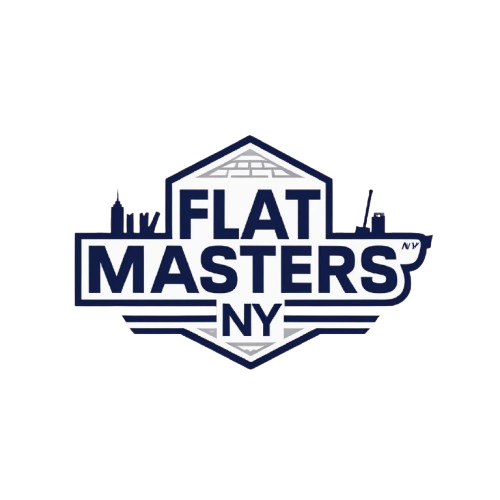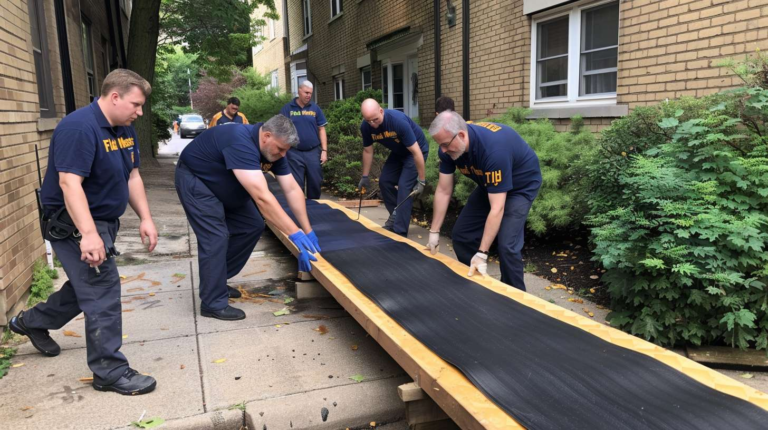Professional Flat Roof Shingle Underlayment Installation Services
Look, after 23 years installing flat roofs across Queens, I can tell you that flat roof shingle underlayment is one of those things most property owners don't think about until water starts dripping through their ceiling. But here's the thing - that thin layer of flat roof shingle paper beneath your roofing material is literally what stands between your building and thousands of gallons of water every year.
At Flat Masters NY, we've installed underlayment on everything from two-story apartment buildings in Astoria to massive commercial warehouses in Long Island City, and I've seen what happens when corners get cut on this critical component. It's not pretty, and it's definitely not cheap to fix later.
What Exactly Is Flat Roof Shingle Underlayment?
Flat roof shingle paper - also called underlayment - is essentially a waterproof barrier that goes down before your main roofing material gets installed. Think of it as your roof's insurance policy. On flat roofs, we typically use modified bitumen, synthetic materials, or specialized rubber underlayments depending on what's going up on top.
Now, some contractors will tell you that flat roof shingle underlayment is just glorified tar paper. Those contractors probably haven't dealt with a Queens winter followed by a brutal summer like we get here. The temperature swings alone will destroy cheap underlayment in 3-5 years, and then you're looking at a full roof replacement instead of just routine maintenance.
Why Your Flat Roof Needs Quality Shingle Paper
Here's what I've learned after installing flat roof shingle underlayment on over 1,800 buildings in Queens - the quality of your underlayment determines whether your roof lasts 15 years or 30 years.
- Water barrier protection: Even the best EPDM or TPO roofing can develop small punctures. Quality flat roof shingle paper stops water from reaching your deck.
- Temperature resistance: Queens gets everything from -10°F winters to 95°F summers. Cheap underlayment becomes brittle and cracks.
- Wind uplift protection: You know those crazy windstorms we get off the East River? Good underlayment helps keep your entire roofing system in place.
- Moisture vapor control: This is huge for flat roofs - improper vapor barriers lead to condensation, which leads to mold, which leads to very expensive problems.
Just last month we stripped a roof on 31st Avenue where the previous contractor used basic 15-pound felt as flat roof shingle underlayment. After only eight years, the entire deck was rotted through because water had been seeping through microscopic cracks in the felt for years.
Types of Flat Roof Shingle Underlayment We Install
Not all flat roof shingle paper is created equal, and frankly, some of the stuff I see other contractors using makes me want to tear my hair out.
Modified Bitumen Underlayment
This is my go-to choice for most commercial flat roofs in Queens. Modified bitumen flat roof shingle underlayment gives you excellent waterproofing with the flexibility to handle our crazy temperature swings. We typically install it in two layers with a torch-down application, and I've got buildings in Elmhurst with this stuff that are still bone dry after 18 years.
Synthetic Underlayment
For residential flat roofs or situations where we need lighter weight, synthetic flat roof shingle paper is fantastic. It's tear-resistant, won't absorb moisture like traditional felt, and handles UV exposure much better. The downside? It costs about 40% more upfront, but over the life of your roof, it's absolutely worth it.
Self-Adhering Membranes
These are perfect for areas where we can't use torches - think buildings with strict fire codes or roofs near combustible materials. Self-adhering flat roof shingle underlayment bonds directly to your deck and creates an incredible seal. I used this stuff on a school in Forest Hills last year, and the building inspector was genuinely impressed with the installation.
Installation Process: How We Do It Right
Installing flat roof shingle underlayment isn't rocket science, but it requires attention to detail that separates good contractors from guys who just slap stuff down and hope for the best.
First, we inspect every square inch of your roof deck. Any loose boards get secured, any gaps get filled, and any protruding nails get hammered down or removed. You'd be amazed how many "professionals" skip this step and wonder why their underlayment fails prematurely.
Next comes the actual flat roof shingle paper installation. We start at the lowest point of the roof and work up, ensuring each row overlaps the previous by at least 6 inches. At seams and penetrations, we're talking 12-inch overlaps minimum. I don't care what the manufacturer's minimum requirements are - in Queens, with our weather patterns, extra overlap is insurance you can't afford to skip.
For modified bitumen installations, we use torches to create a complete seal between layers. My crew chief, Roberto, has been doing this for 15 years and can lay down a perfectly sealed seam in conditions that would send other contractors home for the day. Temperature control is critical - too hot and you damage the material, too cold and you don't get proper adhesion.
Common Problems We See With Flat Roof Underlayment
Oh boy, where do I start? In my years servicing Queens, I've seen some truly spectacular failures of flat roof shingle underlayment systems.
The most common issue? Contractors who use pitched roof underlayment on flat applications. Standard 15-pound or 30-pound felt is designed for sloped roofs where water runs off quickly. On a flat roof, water sits, and regular felt will eventually fail. I can't tell you how many emergency calls we get from building owners who hired the "lowest bidder" only to discover their contractor used inappropriate materials.
Another frequent problem is inadequate overlap at seams. We pulled up a roof in Woodside last spring where the previous contractor had overlapped their flat roof shingle paper by maybe 2 inches. Two inches! In an area where we regularly get driving rain storms. Water had been working its way through those seams for years, creating a massive mold problem in the building's top floor apartments.
Then there's the temperature installation issue. Some contractors try to install flat roof shingle underlayment in freezing weather or during heat waves. Cold weather makes materials brittle and prevents proper adhesion. Hot weather - I'm talking above 85°F - can cause materials to become too soft and tear during installation.
Maintenance and Longevity
Here's something most contractors won't tell you - even the best flat roof shingle underlayment needs periodic inspection and maintenance.
We recommend annual inspections, typically in early spring after winter weather has done its worst. We're looking for any signs of separation at seams, any bubbling or blistering, and any areas where the top roofing material might have been compromised and exposed the underlayment to direct UV rays.
Quality flat roof shingle paper should last 20-25 years under normal conditions. But "normal conditions" in Queens includes everything from hurricane-force winds to ice storms to heat waves that make the roof surface hot enough to fry an egg. So realistic expectations are probably more like 15-20 years for even premium materials.
The good news is that minor repairs to flat roof shingle underlayment are totally manageable if caught early. We can patch small areas, reseal seams, and address minor issues for a fraction of what a full replacement costs.
Why Choose Professional Installation
Look, I get it. YouTube makes everything look easy, and there are definitely property owners who think they can handle flat roof shingle underlayment installation themselves.
But here's what those videos don't show you - the specialized tools required, the safety equipment needed to work safely on flat roofs, and the experience to troubleshoot problems that inevitably arise during installation. Last year, we got called to fix a DIY installation in Bayside where the property owner had spent three weekends and over $2,000 in materials trying to install flat roof shingle paper. The end result leaked in four different places and required complete removal and reinstallation.
Professional installation also comes with warranties. At Flat Masters NY, we guarantee our flat roof shingle underlayment installations for five years on materials and workmanship. If something goes wrong due to installation error, we fix it at no charge. Try getting that kind of peace of mind from a YouTube tutorial.
Cost Considerations
So what's quality flat roof shingle underlayment going to cost you? For a typical 1,000 square foot flat roof in Queens, you're looking at $2.50 to $6.00 per square foot depending on the material and complexity of the installation.
Basic modified bitumen flat roof shingle paper runs about $2.50-$3.50 per square foot installed. Premium synthetic underlayment is more like $4.50-$6.00 per square foot. Self-adhering membranes fall somewhere in the middle at $3.50-$4.50 per square foot.
Now, before you start shopping for the cheapest option, remember that we're talking about protecting your entire building. A $1,500 difference in underlayment cost is nothing compared to $25,000 in water damage repairs.
Flat Masters NY: Your Queens Flat Roof Specialists
At Flat Masters NY, flat roof shingle underlayment isn't just another service we offer - it's the foundation of every quality flat roof system we install.
We've been serving Queens property owners since 2001, and in that time we've developed relationships with the best suppliers in the area. We get our materials from Beacon Building Products on Northern Boulevard and ABC Supply on Queens Boulevard - both companies that stock premium flat roof shingle paper and can get specialty items quickly when we need them.
Our installation crews are all employees, not subcontractors. That means consistent quality, ongoing training, and accountability for every job we complete. Roberto, our senior installer, holds certifications from GAF, Firestone, and Carlisle - basically every major manufacturer of flat roofing materials.
We're fully licensed (License 704521) and insured, and we pull permits for every job that requires them. Some contractors try to skip the permit process to save time and money, but proper permits protect you and ensure the work meets local building codes.
Give us a call at (917) 994-7618 for a free assessment of your flat roof. We'll explain exactly what type of flat roof shingle underlayment your building needs and provide a detailed estimate with no hidden fees or surprise charges.
Remember, your roof is your building's first line of defense against New York weather. Don't trust that protection to anything less than professional installation of quality flat roof shingle paper. Your tenants, your investment, and your peace of mind depend on it.


